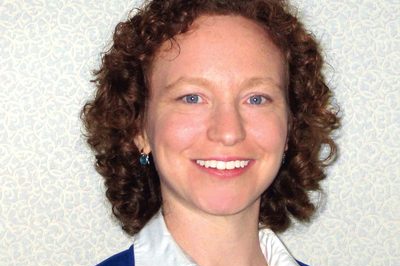Finally, someone got it right. Showtime’s new dark comedy series “Nurse Jackie” has portrayed lesbian moms in a way that is both believable and doesn’t fall prey to overused stereotypes.
Most programs that have featured lesbian parents, including “ER,” “Friends,” “NYPD Blue” and, more recently, the short-lived “Cashmere Mafia,” show them trying to get pregnant or caring for infants. Even LGBT-specific series such as Showtime’s “The L Word” and “Queer as Folk,” or Logo’s “Exes and Ohs” and “Rick and Steve,” didn’t avoid the trap: All involved madcap escapades in the search for a sperm donor.
“Nurse Jackie,” starring “The Sopranos’” Edie Falco as the titular character, breaks new ground both by showing an adult child of lesbian moms and by not making his family the central focus of his character. For the first few episodes, we don’t know anything about the family of Dr. Fitch “Coop” Cooper (Peter Facinelli). We simply see him in the context of his job, an overconfident, self-absorbed young doctor with a form of Tourette’s Syndrome, which gives him a tendency to grab his female coworkers’ breasts when he gets nervous. He is, in all honesty, a bit of a prick.
HOW IT GOES
When his moms show up at the hospital after one has a gall-bladder attack, however, fellow doctor Eleanor O’Hara (Eve Best) overhears him refer to them both as “Mom.” “You have two mothers?” she asks. When he replies in the affirmative, she responds, “Bravo, Dr. Cooper.” Having two moms could be the one redeeming thing about him, she implies’ the one characteristic that makes him stand out from all of the other self-important young doctors who have come through the doors.
But the show goes further in its exploration of lesbian families. While Coop and his non-biological mom, Leslie Scheinhorn (Swoosie Kurtz), are waiting for his biological mom (Blythe Danner) to awaken after surgery, he reflects on his childhood desire to have Leslie’s last name. That way, he figured, he would be assigned to a different homeroom, where the kids would not tease him about his Tourette’s, obsessive-compulsive disorder or having two moms. Leslie observes that they probably would not have been any different.
The scene acknowledges the difficulties children of LGBT parents may face, but does so without pedantry. It also conveys that Coop is defined by more than simply being the son of lesbians, and that the teasing he endured in childhood had many roots. Complicated? Yes, but the best characters always are.
With characteristic lack of diplomacy, Coop then confesses to Leslie, “I loved you more,” while Danner lies next to them, unconscious.
Leslie takes it in stride; she is his mother and knows him. “The reason I was more fun was because she wanted us to bond. She gave me all the fun stuff,” she explains. “She gets the credit, not me. And you know what? It worked. Here we are.”
HOW IT FEELS
To me, that moment hit a nerve. Every lesbian family I know that has one bio mom and one non-bio mom has pondered whether there will be differences in the bond between each of them and their children. The answer varies from family to family, but the question is the same. “Nurse Jackie” manages to raise this shared issue and yet present it in a way that makes it specific to the characters, especially the socially inept Coop.
It is clear, however, that his understanding of both his moms runs deep. He knows his bio mom wants the medical details of her procedure and will want to see her gall bladder afterward. He duly saves it in a jar for her. There is an easiness about the relationship among the three of them despite the stressful situation. They are a family and know each other well, quirks and all.
Dr. O’Hara later refers to Danner’s character as Coop’s “vagina mom,” “the one that actually gave birth to him.” She continues, “The other one is … the other one.”
At first, it seems like a line thrown in just for laughs. Falco’s Jackie chuckles vaguely and the scene ends. At the same time, however, it highlights that it is easy for people to identify a biological mother’s role with respect to her children, however shallow such a view might be. The non-biological mother’s role is more difficult for people to assess. She is often indeed simply “other.” As Coop and Leslie show us, however, sometimes our real relationships belie our titles.
HOW IT WORKS
The show’s deft handling of a lesbian family should come as no surprise. Two of the episode’s writers, Nancy Fichman and Jennifer Hoppe, are out lesbians. Yet another writer has two moms and put much of his own story into Coop’s character, as executive producers Liz Brixius and Linda Wallem, out lesbians themselves, revealed to online television guide Zap2it. The show also features gay Muslim nurse Mo-Mo (Haaz Sleiman) as Jackie’s close friend, and includes bearish gay nurse Thor (Stephen Wallem) in a smaller role.
It is unclear if we will see Danner and Kurtz again on “Nurse Jackie.” It would be a shame if we don’t; the Emmy Award-winning actors bring both believability to their roles, and have great chemistry with Facinelli. The Cooper-Scheinhorns have the potential to teach us something not only about lesbian families, but about families and human relationships in general. That’s good medicine.
Dana Rudolph is the founder and publisher of Mombian (www.mombian.com), a blog and resource directory for LGBT parents.

